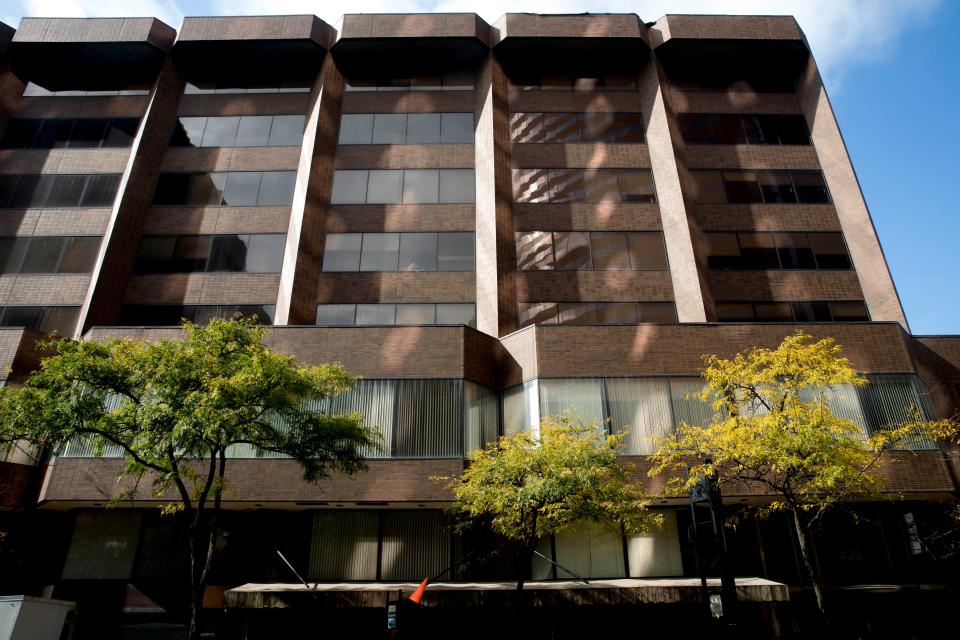Brief: Key witness against P.G. Sittenfeld cooperated after facing campaign finance charges
- Oops!Something went wrong.Please try again later.
The key witness in the corruption cases against former Cincinnati city councilmen P.G. Sittenfeld and Jeff Pastor worked with the FBI as he faced possible charges for campaign finance law violations and “other potential federal crimes,” Sittenfeld's attorneys say in newly filed documents.
Federal prosecutors have previously said local developer and former Cincinnati Bengal Chinedum Ndukwe cooperated in the cases against Pastor and Sittenfeld because he was “sick and tired” of city officials seeking money in exchange for help on development deals.
Sittenfeld's trial is scheduled to begin June 21 in U.S. District Court in Cincinnati.
An attorney for Ndukwe, Scott Croswell, told The Enquirer that at the time Ndukwe agreed to cooperate in the investigation, "he did not face campaign finance law violations or any other federal crimes."
"The evidence will come out at trial," Croswell said.
Sittenfeld's attorneys, he added, were using the pretrial filing to "spin the facts to their best advantage."
The new information came in a trial brief Sittenfeld's attorneys filed late Tuesday. U.S. District Judge Douglas Cole has asked both sides to provide context to the complex case as he prepares to rule on a multitude of issues before the trial.
The briefs were not due until May 27, and federal prosecutors are still expected to file one. Sittenfeld's brief is based on discovery between his attorneys and prosecutors — which is not yet public record but some of which has been described in pretrial filings.
Proffer agreement
The 30-page brief provides new insight into Ndukwe's role in the investigation.
According to Sittenfeld's attorneys, Ndukwe himself entered into a written “proffer” agreement with federal prosecutors because he faced possible charges. That agreement, according to the documents, prohibits prosecutors from using anything Ndukwe told investigators, if charges are ultimately filed against him.
The documents say Ndukwe began “working for the government” in March 2018, after an investigation “revealed his involvement in campaign finance law violations…and an assortment of other potential federal crimes.”
Sittenfeld’s attorneys also say in the documents that the FBI “began paying Mr. Ndukwe to target public officials.”
Former U.S. Attorney David DeVillers told The Enquirer in late 2020 that Ndukwe was “sick and tired of having to do this, this pay-to-play…so he decided to work with us.”
Sittenfeld and Ndukwe had known each other for almost a decade when the investigation began. Court documents say their relationship "evolved into a friendship" that included discussions of family and sharing photos of their newborn children.
Ndukwe also was one of Sittenfeld's most consistent and enthusiastic campaign donors, the documents say. Between 2012 and 2017, Ndukwe and his family members donated more than $10,000 to Sittenfeld's city council campaigns.
What follows in the documents are details that have already been shared with the public. Ndukwe, in October 2018, called Sittenfeld and told him he had out-of-town investors interested in redeveloping 435 Elm St., a blighted Downtown property that Ndukwe hoped to turn into a hotel with a sports-betting operation.

The out-of-town developers were actually undercover federal agents. Over the next two years, there were phone calls, meetings, parties in penthouse apartments and campaign contributions. This is where the two sides diverge.
Prosecutors say Sittenfeld accepted money in exchange for favorable votes on the project. He faces charges of bribery, honest services wire fraud and attempted extortion.
Sittenfeld's attorneys say there was nothing illegal about the donations.
'Case involves politics'
"This case involves politics and campaigning in America. And whether we like it or not, office holders may seek and accept campaign contributions while making decisions on votes and legislation — all of which is legal and fundamental to our representative form of government," his attorneys say in the brief.
An attorney for Sittenfeld declined to comment.
A spokeswoman for the U.S. Attorney’s Office said “the government will present its evidence at trial.”
Pastor faces separate corruption charges. His trial had been set to begin this month but was delayed indefinitely after his attorney, Ben Dusing, disqualified himself after having his law license suspended.
Sittenfeld was indicted in November 2020, which led to him being suspended from city council and ultimately derailed his political career. Sittenfeld was a rising political star and the frontrunner to be elected mayor in 2021.
This article originally appeared on Cincinnati Enquirer: Brief: Key witness against Sittenfeld faces campaign finance charges

